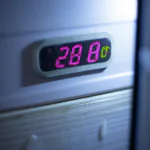If your home is going to be vacant for an extended period of time this winter, you may be wondering what the best temperature is to leave your thermostat set at.
On the one hand, you don’t want the inside of your home to get too cold and increase the risk of freezing pipes or other damage. But on the other hand, you don’t want to keep the heat on unnecessarily and waste money and energy.
So what’s the right middle ground? As a general rule of thumb, it’s best to leave your heat on and set your thermostat to somewhere between 55 and 60 degrees. By doing this, you can help avoid major temperature swings inside your home and keep things from getting too cold or too hot.
Of course, every situation is different and you may need to adjust this general guideline depending on the specific circumstances of your home. For example, if your home is particularly well-insulated, you may be able to get away with setting the thermostat a few degrees lower. Or if you know that a cold snap is coming and your pipes are vulnerable, you may want to set the thermostat a few degrees higher as a precautionary measure.
No matter what, the most important thing is to use your best judgment and err on the side of caution. By taking some simple steps like this, you can help ensure that your home stays safe and comfortable all winter long.
Table of Contents
What temperature should I keep my vacant house in winter in Florida?
When temperatures drop in winter, it’s important to take measures to keep your home warm and comfortable. But if you’re planning on being away from home for an extended period of time, you may be wondering what temperature you should keep your house in Florida.
There are a few things to consider when making this decision.
- How long will you be away from home? If you’re only going to be gone for a few days, you may not need to worry too much about the temperature. But if you’re planning on being gone for weeks or even months, you’ll want to make sure your home is kept at a comfortable temperature.
- Another thing to consider is the type of home you have. If you have a brick or stone home, it will retain heat better than a wooden home. Therefore, you may not need to keep the temperature as high as you would in a wooden home.
- Consider the weather outside. If it’s going to be particularly cold outside, you’ll want to make sure your home is warm enough so that you don’t come home to a freezing house.
Keeping all of these factors in mind, it’s generally recommended that you keep your vacant house in Florida at a temperature of 65 degrees or lower in winter. This will help to ensure that your home is comfortable when you return and that you don’t come home to a cold house.
Can you leave a house unheated in the winter?
Leaving a house unheated in the winter may seem like a drastic measure, but it’s actually not as bad as it sounds. There are a few things you need to keep in mind to make sure your house stays safe, but it is possible to leave a house unheated in the winter.
One of the most important things to remember is that you need to keep the inside temperature above freezing. This means that you’ll need to set the thermostat to at least 50-55 degrees Fahrenheit. This will help prevent any pipes from freezing and bursting.
You should also take some time to seal up any cracks or gaps around the doors and windows. This will help keep the heat in and the cold out. Make sure to put up any window treatments to help insulate the home as well.
Another thing to keep in mind is that you’ll need to ventilate the house occasionally. This can be done by opening up the windows for a few minutes each day. This will help prevent any condensation from building up and causing mold or mildew problems.
Leaving a house unheated in the winter is possible, but it does take a bit of preparation. as long as you take the necessary steps, you can rest assured that your house will be safe and sound.
How do I leave my house empty in the winter?
As the winter season approaches, many of us begin to think about how we will keep our homes warm and toasty while we’re away on vacation. But what about those of us who have to leave our homes empty for extended periods of time? How do we ensure that everything will be alright when we return?
Here is a checklist of things you can do to make sure your home is safe and sound while you’re away:
- Turn off the water supply. This will prevent any potential water damage in the event of a pipe burst.
- Drain the waterlines. This will also help to prevent any water damage and will keep your pipes from freezing.
- Insulate pipes. Wrapping your pipes in insulation will help to keep them from freezing and bursting.
- Turn down the heat. There’s no need to keep your home at tropical temperatures while you’re away. Turning down the heat will save you money on your energy bill and will help to prevent any fires.
- Unplug all appliances. This will help to prevent any fires that could be caused by faulty electrical wiring.
- Throw out the trash. Empty all the trash cans in your home to prevent any unpleasant surprises when you return.
By following these simple tips, you can rest assured that your home will be waiting for you just the way you left it when you return from your winter vacation.
What temperature is too cold for a house?
Did you know that the temperature of your home can have an impact on your health? If it’s too cold, it can actually increase your blood pressure and put you at risk for cardiovascular disease. And if it’s too warm, you may be diminishing your resistance to respiratory diseases.
So what’s the ideal temperature for a healthy home? According to experts, it should be between 14 and 15 degrees Celsius. anything below 13 degrees is too cold, and anything above 15 degrees is too warm.
Of course, this isn’t always possible to achieve, especially in the winter months. But it’s important to try to keep your home as close to this temperature as possible. There are a few ways you can do this, such as using a space heater or keeping your blinds closed during the day to trap in heat.
What temperature is your home right now? And how do you make sure it stays at a healthy level?
What temperature should I leave my house when away?
As temperatures start to rise, many of us begin to dread the thought of having to leave our homes for extended periods of time, knowing that the soaring temperatures can quickly lead to an uncomfortably hot and stuffy house.
There are a few things that you can do to help keep your home cooler and more comfortable while you’re away, without having to waste energy and money unnecessarily.
One of the simplest things that you can do is to adjust your thermostat settings. In the summer, keep your house warmer than normal when you are away, setting the thermostat to 72° – 78°F only when you are at home and need cooling. Set your thermostat at as high a temperature as comfortably possible and ensure humidity control if needed.
Another way to help keep your home cool is to block out the sun’s rays. Close curtains or blinds on windows that receive direct sunlight, especially during the hottest hours of the day. You might also want to consider investing in some solar shades for particularly sunny windows.
Make sure that your home is well-ventilated. Open windows and doors when it’s cooler outside and close them when it starts to heat up. If possible, use fans to circulate air throughout your home.
By following these simple tips, you can help keep your home cool and comfortable all summer long – without having to break the bank.




